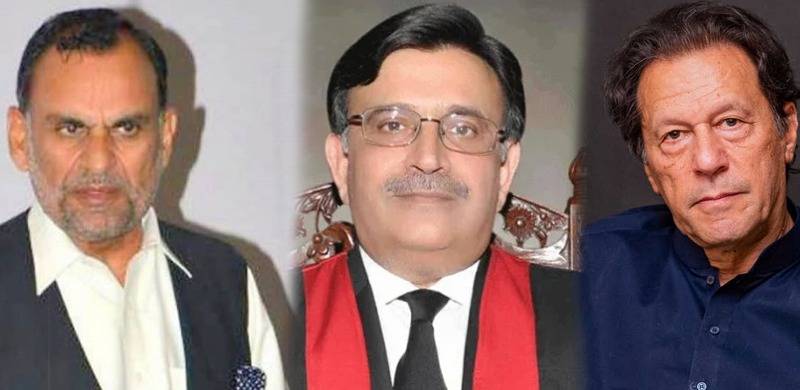
Pakistan Tehreek-e-Insaf (PTI) chairman Imran Khan on Monday questioned the Supreme Court on Monday if Article 14 of the Constitution -- Inviolability of Dignity of Man -- was only applicable to the 'mighty'.
In a Twitter thread posted the same day, the PTI supremo asked top court judges if the provision was only applicable to the "powerful of the State" and protection of "basic human dignity" did not extend to others. "Article 14 of our Constitution refers to "Inviolability of dignity of man"; so my question to our Honourable SC Judges is whether this provision is only applicable to the powerful of the State & for everyone else there is no protection of their basic human dignity?"
He went on to detail PTI Senator Azam Swati's 'ordeal' and developments following after. "Senator Swati was stripped naked, tortured, humiliated through an illegal video sent to his wife. For weeks he has sought justice from SC to no avail. So when he reacts in justifiable anger & frustration, he is put in jail & at last count 15 FIRs registered against him across Pak"
Where, Khan questioned, was the "justice in all this". "Again, I ask our Honourable judges where is the justice in all this? Is the Article 14 Constitutional provision only to be applied selectively for the high & mighty State functionaries?"
Swati was arrested on Sunday for posting ‘highly obnoxious’ tweets against military officials including the outgoing army chief. This is Swati’s second arrest in two months by the FIA for using inappropriate language against the army officials on the social media. Swati reportedly used abusive language against General Qamar Javed Bajwa and Major General Faisal Naseer on Nov 26. According to the FIR, the senator stated that he would go after a senior military official at every forum.The report further states that Swati attempted to “provoke” the general public and personnel of armed forces by trying to create “a feeling of ill-will among the pillars of the state”.
In a Twitter thread posted the same day, the PTI supremo asked top court judges if the provision was only applicable to the "powerful of the State" and protection of "basic human dignity" did not extend to others. "Article 14 of our Constitution refers to "Inviolability of dignity of man"; so my question to our Honourable SC Judges is whether this provision is only applicable to the powerful of the State & for everyone else there is no protection of their basic human dignity?"
He went on to detail PTI Senator Azam Swati's 'ordeal' and developments following after. "Senator Swati was stripped naked, tortured, humiliated through an illegal video sent to his wife. For weeks he has sought justice from SC to no avail. So when he reacts in justifiable anger & frustration, he is put in jail & at last count 15 FIRs registered against him across Pak"
Where, Khan questioned, was the "justice in all this". "Again, I ask our Honourable judges where is the justice in all this? Is the Article 14 Constitutional provision only to be applied selectively for the high & mighty State functionaries?"
Swati was arrested on Sunday for posting ‘highly obnoxious’ tweets against military officials including the outgoing army chief. This is Swati’s second arrest in two months by the FIA for using inappropriate language against the army officials on the social media. Swati reportedly used abusive language against General Qamar Javed Bajwa and Major General Faisal Naseer on Nov 26. According to the FIR, the senator stated that he would go after a senior military official at every forum.The report further states that Swati attempted to “provoke” the general public and personnel of armed forces by trying to create “a feeling of ill-will among the pillars of the state”.
Senator Swati was stripped naked, tortured, humiliated through an illegal video sent to his wife. For weeks he has sought justice from SC to no avail. So when he reacts in justifiable anger & frustration, he is put in jail & at last count 15 FIRs registered against him across Pak
— Imran Khan (@ImranKhanPTI) November 28, 2022
Again, I ask our Honourable judges where is the justice in all this? Is the Article 14 Constitutional provision only to be applied selectively for the high & mighty State functionaries?
— Imran Khan (@ImranKhanPTI) November 28, 2022

